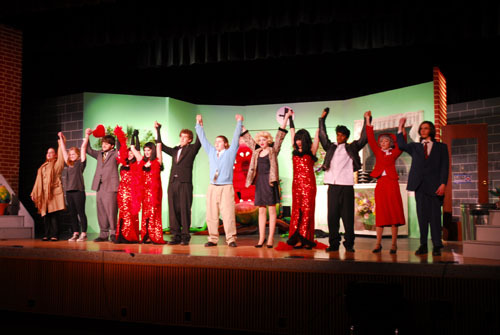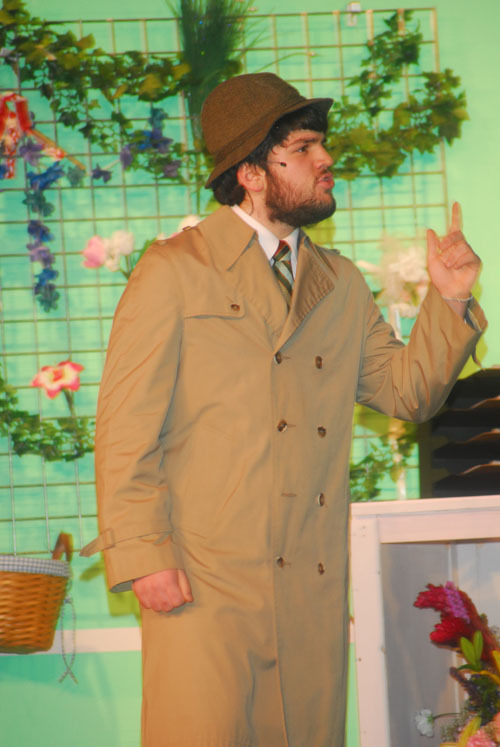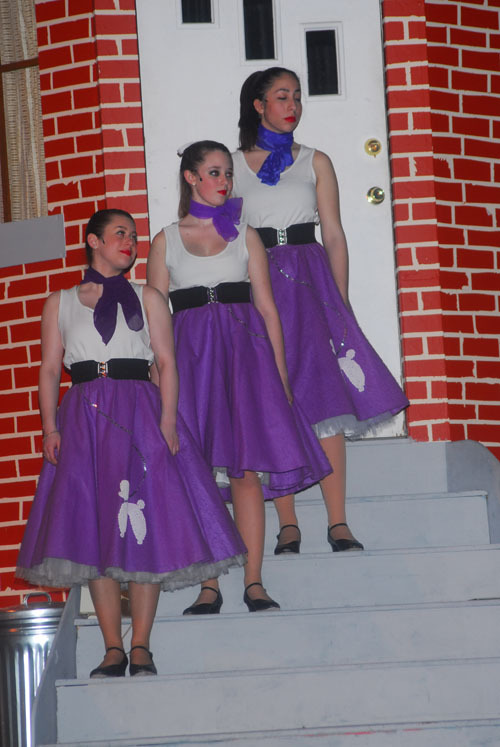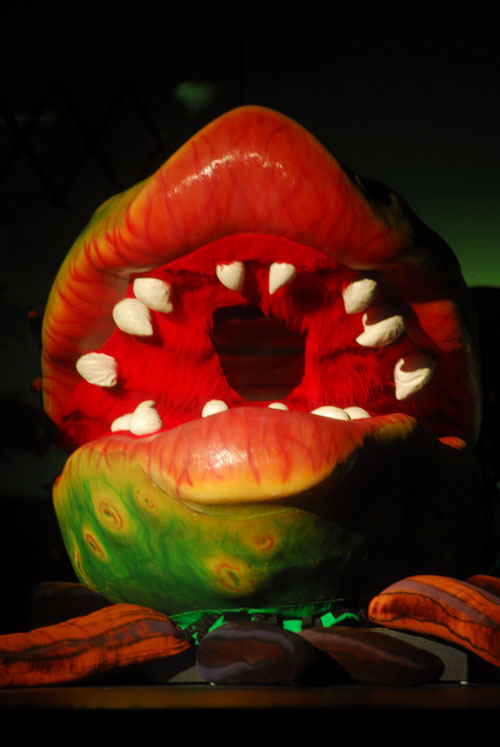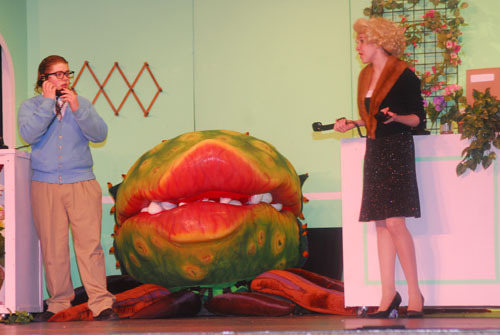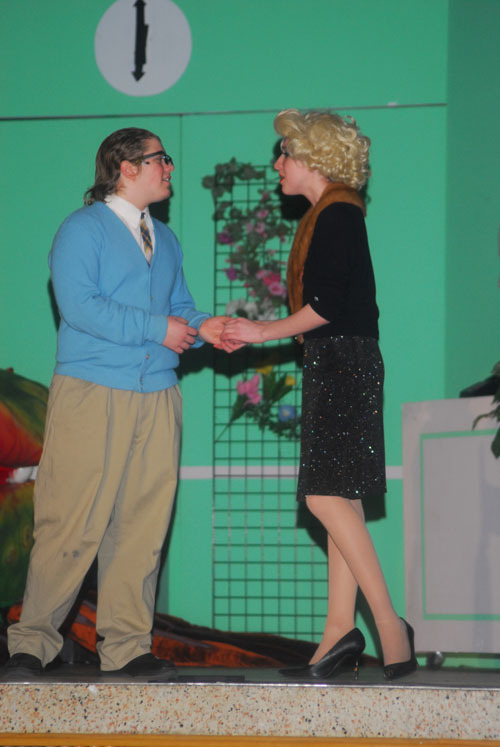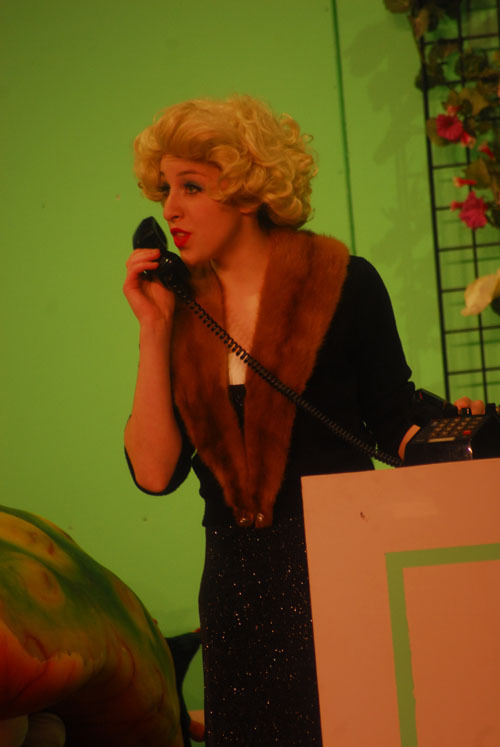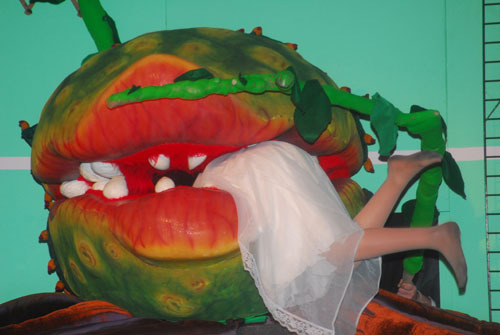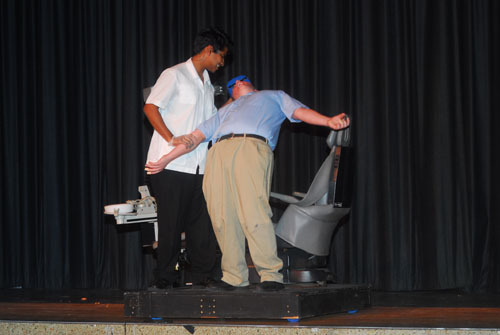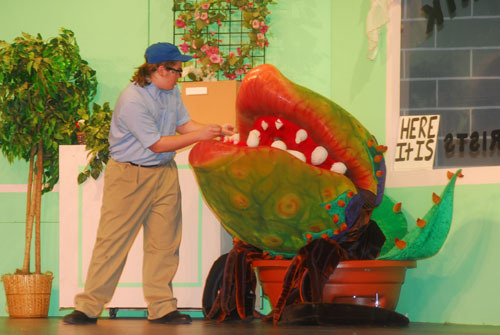Clarke's 'Little Shop of Horrors' is a delight
Reviewer's take on musical performance at W.T. Clarke High School
It was 1982 and I was living in the grungy East Village, an aspiring actress hoping for that big break. Each day on my way to auditions I’d try to step over homeless people living in cardboard boxes, avoid the drunks and drug addicts sprawled across the sidewalks and stay clear of the prostitutes looking for their next date.
In those days parts of the East Village were dangerous, an area sometimes refereed to as “skid row.” It was a scary place, but right around the corner from where I lived, there was literally magic happening every night. A new play, “Little Shop of Horrors,” was being performed at the Orpheum, a show that was basically about greed, starring a group of hapless stereotypes and one extraordinary plant.
“Little Shop of Horrors” was creepy, kind of bizarre, but definitely worth going without dinner for a few days to see. I saw it more than once, never forgot it, and wondered when I heard that W.T. Clarke High School was going to perform it, if it would hold up in 2010. I wasn’t worried about the music, which is a catchy combination of musical theater and rock and roll. No, it was the script; and the message.
Would the kids understand it and even more, would the audience find the play funny and relevant? No worry there – the audience loved it and if the kids didn’t understand lines that made references to Hedy Lamarr, Donna Reed, and the old sleeping pill Sominex, who cares. What a wonderful night of theater it was.
Everything was green in director Mark Kenny’s production except his direction. Able to bring out the best in his young talent he kept the play moving, sometimes at breakneck speed as in the case with “Mushnik & Son” performed with amazing clarity by Seymour (Henry Morrow, a gifted singer) and the overbearing boss Mushnik (Jordan Green). A businessman, Jordan plays Mushnik as an affable wheeler dealer, a phony, with a knack for exploiting weakness in others. And there is much to prey on in a guy like Seymour, someone who no one looks at twice; the kind of guy that people push out of the way, that is, if they notice him at all.
No one really cares much about Seymour, who Henry plays as a nebbish but totally likable underdog, until he shows them his new plant, the Audrey II. Surrounded by green walls, a green plant, and the possibility of a lot of green money Seymour becomes the unlikeliest success story. A unique species, the Audrey II has grown to amazing proportions all due to Seymour, who has secretly fed it his own blood. Covered in band-aids Seymour sacrifices himself to ensure that his plant continues to grow. If he’s a success, he’ll get everything he wants, including the love of his life, his co-worker Audrey. Often coming to work with broken bones and a black eye, Audrey, played by the lovely Marissa Calvanico-Weinstein, would be a welcome addition to Seymour’s life of loneliness.
Calvanico-Weinstein’s Audrey is gentle, sweet, and kind. When she comes to work with a black eye your heart goes out to her and you root for her to leave her abusive dentist boyfriend, Orin, (Nithin Mathew). She loves Seymour, would love to marry him and move to a place where everything is green. Not a fancy place like Levittown, she says. No. Just a place where Audrey can have the little things that make life worth living — a toaster, a fence of real chain links, plastic on the furniture to keep it clean and best of all a sweet guy like Seymour. Marissa brings charm, honesty, and vulnerability to Audrey, a part often played way over the top sapping the sympathy right out of her. You wish the best for Audrey because Marissa makes you love her. A young actress, she is definitely someone to keep an eye on in future Clarke productions.
Nithin’s characterization of the sadistic dentist was a standout memorable performance. The dentist is a rat through and through. When he dies, the victim of his own inability to stop sucking up the dental laughing gas, you laugh too, but you feel a twinge of guilt. What happens to the dentist – he basically laughs himself to death – is awful, really. The dentist is sadistic, beats women, doesn’t have one moment where you like him, but somehow, and this is due to Nithin, you are sorry when he dies. He’s a lot of fun to watch.
Of note also were the “downtown girls” Chiffon (Alex Fanelli), Crystal (Sarah Shaiman), and Ronnette (Rebecca Calvanico-Weinstein) who managed to keep the action of the play moving as they shimmied and swayed in unison, often adding clarity to the storyline sometimes with humor. The girls had some great pipes and succeeded in singing a difficult score. That score by the way was performed by a pit that sounded very much like a professional group of musicians. The music was totally enjoyable led by musical director Dave Fletcher. Bravo to him and choreographer Irene Fotakis who was very adept at finding the charm of the play keeping the cast moving simply and with purpose. This was particularly evident with the downtown girls.
And last but not least, many accolades go to Michael Rosenberg, the voice of Audrey II, whose booming and commanding voice brought much humor and creepiness to the plant that wanted to take over the world. And even though we didn’t see the puppeteers, Niko Marquez, Kelly Clements, and Sydney Matuszak they were the driving force that made the plant seem real. Without them, we would have never been terrorized by the Audrey II.
So in hindsight and this is not an idea I would have ever had in 1982, is the show really about corporate greed? Were Howard Ashman (book and lyrics) and Alan Menken (music) implying that you have to open a vein, abandon all morals and ethics, and be willing to commit murder to rest easy in the lap of luxury? Or was “Little Shop of Horrors” written as a fun, comical, quirky opportunity to enjoy some guilty pleasures? “You didn’t have nothing till you had me.” Audrey II says to Seymour. “I don’t know anybody who should be fed to a hungry plant.” Seymour tells the plant when it begs for human blood.
I guess the trick is to stop thinking of everyone that you know that might just be plant food. Perhaps it would be better to just sit back and enjoy the show. At Clarke High School, that’s exactly what I did.

